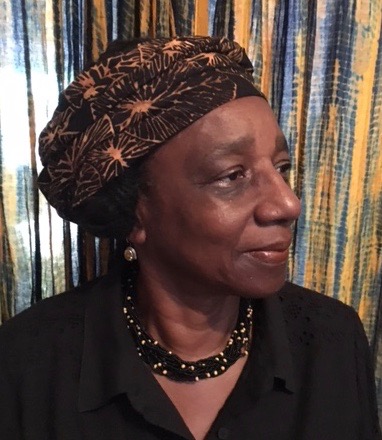
This is an interview with Jereann King Johnson, a founder of the African American Quilt Circle of Durham and the Heritage Quilters of Warren County, as well as an advisor of the Kindred Spirits quilt conference. Callie Swaim-Fox, RCWMS intern, interviewed Jereann. This interview was edited for length and clarity.
Callie:
First, tell me a little bit about your personal history with quilting.
Jereann:
I think it’s something that I have been connected to all my life. I’ve been connected to a community where quilts were essential all my life. And as I have often times said, in my community, quilts were like currency. If you had them, it meant a degree of security, a sense of security.
I started quilting when I was about eight or nine, sewing pieces together for my mother’s quilt blocks. It wasn’t until I was in my very early twenties that I had an interest in making quilts all by myself for myself. And, so I’ve been doing it ever since.
I kind of moved from making quilts by myself to working with a few friends here in Warren County on Sunday afternoons. We worked together, looking at patterns and discussing quilting techniques, and how to “do this and that.” We were remembering what we understood from our childhoods and being around older quilters when we were kids, trying to make sense of the whole process. We taught each other what we knew.
And then there was just some interest in other folk who wanted to get a group together. I worked in Durham and one of my board members and a friend, Candace Thomas and Bertie Howard, along with one of Bertie’s friends, Miss Helen Sanders, we said, “Let’s get together. And let’s convene a bunch of people who are quilters and are interested in quilting and see what happens.” And that was the birth of the African American Quilt Circle.
Maybe three years later, four years later I was no longer working in Durham full time. And with the people I had been quilting with here in Warren County, we decided to birth the Heritage Quilters.
It’s been a really evolutionary process for both groups. We see ourselves as unique quilting groups in the sense that we are dedicated to traditional African American quilting traditions as well as art quilting and modern quilting. And, I think both groups bring a particular consciousness to the value that quilts have in representing culture and history and the future, and the narratives that they can hold as well as the warmth they can hold.
Callie:
I’m curious, what does having Kindred Spirits: A Convergence of African American Quilters this summer mean to you?
Jereann:
It’s gonna be like fireworks and magic stirred up in a cauldron of love and joy. How about that?
Callie:
Yeah, that sounds pretty good.
Jereann:
I think that it’s the first of its kind in this area. There’s so much history here in the region. And I think with the presenters and the teachers and the quilters themselves it’s going to be an experience that will be–life-changing is almost an understatement. I think it’s just going to be quite memorable.
I think it will take our practices into a whole other sphere, unknown to us right this minute, but we’ll know at the end of the conference.
Callie:
What are you most looking forward to about the conference?
Jereann:
I’m most looking forward to the camaraderie, and sharing that space with the quilters. That’s what I’m most interested in. And, I also think about the trajectory that this conference will put us on. We will be able to name some things that we perhaps have not named in the past. Or, you know, we can create new codes for understanding the essential concepts to quilting and how they form a framework for community development and community thriving. It’s gonna be awesome. So I’m looking forward to the awesomeness that I know will take place in Durham at this conference.
Callie:
What is your hope for the future of African American quilting and community organizing?
Jereann:
I’ll tell you one hope—this is really important to me. We talk about the environment and reducing our carbon footprint, and so forth like that. And, I hope that we will see how quilting and quilts particularly can help play an important role in reshaping our environment.
Quilts traditionally were used for keeping us warm. And I still think that that is an important thing, because if you can put a quilt on the bed, you can cut the thermostat down. That seems obvious and simple, but it is true, it does matter.
And I think the other thing that I hope for quilts and quilting is that we continue to be open-minded about how we build the narratives within our quilts. That there is no one single story, no one single function of a quilt. And, I think that that is something that African American quilters and quilts represent. We can keep that trajectory open so that we get away from “quilting is this and that,” but quilting is omnipotent. Which is not quite the right word but, it’s everything. It’s everywhere. I’m going to stop and say quilting is a little short of God, but it’s right up there on that same level, you know? It is.
Callie:
Well, that’s wonderful. Is there anything else you would like to share?
Jereann:
I think what Kimberley [Pierce Cartwright]’s imagination is doing for us is giving us another level to step up to. And I think that that’s so important. That’s it.
Callie:
Thank you so much, Jereann.
You can learn more about the African American Quilt Circle of Durham here, the Heritage Quilters of Warren County here, and learn more and register for Kindred Spirits: a Convergence of African American quilters here!
Looking forward to meeting this pioneer!